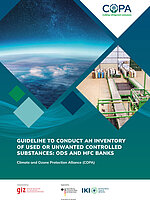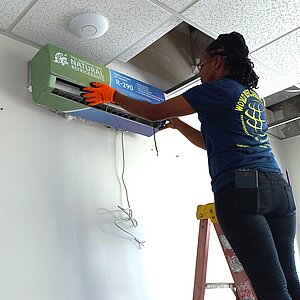ODS in Tunisia

Protecting the environment through environmentally sound management of ozone depleting substances (ODS).
The project "Management and destruction of existing ozone-depleting substances (ODS) banks" recently finalized a comprehensive national inventory in Tunisia in close cooperation with the National Ozone Unit (NOU) of the National Agency for the Protection of the Environment (ANPE). The results and recommendations were presented to the stakeholders from the refrigeration and air sector as well as to the two national cooperation agencies of the project (National Waste Management Authority (ANGed) and National Agency for Energy Management (ANME)) at a workshop in Tunis organized by the project. At the same workshop the project informed Tunisian experts from the public, academic and private sector about how to establish an environmental friendly management of ODS stocks.

Refrigerants used for cooling and isolation are ODS and have a high Global Warming Potential (GWP). They are thus harmful to climate. Old refrigerators and air conditioners have a considerable stock of these substances. Substances like hydrochlorofluorocarbons (HCFCs) and chlorofluorocarbons (CFCs) are not regulated under any international convention. As finance and technical cooperation is limited, good management practices are hardly known or in place. The project "Management and destruction of existing ozone-depleting substances (ODS) banks" funded by the International Climate Initiative (IKI) of the German Federal Environment Ministry (BMU) therefore supports selected partner countries by providing them with national roadmaps and banks inventories and assists them in designing their policies and practical implementation.
The inventory, based on the latest national data available on quantities of ODS and their substitutes hydrofluorocarbons (HFC), was compiled in a two steps approach 1) taking into account available national statistical data (e.g. sales figures and imports) and 2) local data collection and verification supported by local experts. The analysis suggests a stock of 2,386 tons of ODS. 89 percent of this amount results from the private use of air-conditioning systems, followed by the sectors of central air-conditioning, domestic refrigerators and industrial refrigeration.
The workshop in Tunisia, jointly organized by the Deutsche Gesellschaft für Internationale Zusammenarbeit (GIZ) GmbH and ANPE, focused on a participatory approach and served as an opportunity for an open exchange and a collection of suggestions, recommendations and feedback that should contribute to the development of a roadmap for the establishment of a national system.

The “Global roadmap on ODS bank management” provides a deeper insight into the optimal strategies for managing ODS. The awareness movie “ODS Bank an unseen threat” gives further insights into the topic.
The link has been copied to the clipboard
Contact
IKI Office
Zukunft – Umwelt – Gesellschaft (ZUG) gGmbH
Stresemannstraße 69-71
10963 Berlin













